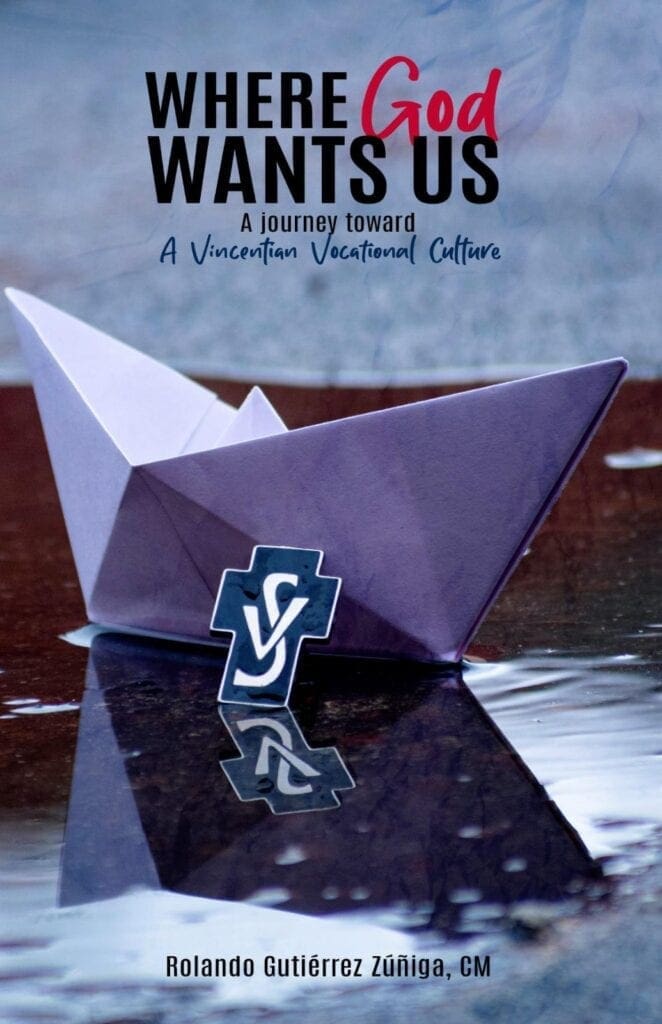A Response to Brother Francisco Berbegal, CM
By: Father Rolando Gutiérrez Zúñiga, CM

Brother Francisco has placed on the table not only some of the essential principles of a vocational culture, which I have tried to analyze in my book Where God Wants Us, but he has also pointed out some challenges that arise in the life of each province, community and missionary when they attempt to revitalize the essentials of our vocation as understood from the perspective of a vocational culture.
I regret not having a magical recipe that immediately resolves the difficulties that Brother Paco has presented to us and that may have to be confronted in our spiritual life and in our ministries on behalf of the poor, but I am sure that even the most evangelical method is far removed from those quick solutions that are usually the result of anxious decisions that seek to separate prematurely the wheat from the weeds.
In reality, I believe both difficulties have a common root: an inconsistency or a lack of harmony between the values that are proclaimed in the institution (for example: mystics of the mission or the poor are our lot and inheritance) and what is experienced, lived and acted upon. In other words, I am referring to an attitude that is clearly Vincentian but that has problems feeling and creating charismatic action.
The solution is not simple or easy because we are dealing with an unconscious model of being missionary, being a congregation or a province, a model grounded on a well-intentioned attempt to embody the charism from the perspective of structures, which is not the same as authentic processes. It seems to me that, for our reflection, we need to distinguish process from structure and understand that structures are ordered in accord with processes. Let us see:
Structures are the legs while processes are the act of walking. If a person’s legs are amputated, they will be able to walk again, but with a prosthesis. Their process of walking will continue, but the old structures no longer fit the need. In the area of vocation, the issue is more complex. It is not simply a matter of abandoning some structures for others (as some erroneously did in previous decades) nor of defending structures at all costs.
Sometimes when serious and deep reflection is generated (attitudes), attempts are made to respond by creating structures (for example, an activity on the calendar, a talk on a topic, a campaign that begins and ends), which can be beneficial for a good process. Nevertheless, these structures will not and cannot produce automatic fruits. So, in a short time, another person will come forward, and with the same candor, he will create a new structure, and the cycle repeats itself as the various forces decrease and increase. Little by little, people begin to feel that regardless of what is done, nothing works anymore.
With the examples that Brother Paco presents, we could say, that if we have been formed in a system in which the rational element predominated so that even spirituality was approached from a perspective of scientific accuracy, it is easy to see that the mystical richness of the Vincentian charism has been relegated to certain spaces. In other words, the richness of the Vincentian charism has been relegated to some structure and no matter how good those structures might be (nothing could be better than the Eucharist!), nevertheless, over the years, if attitudes are not formed, then we have a spirituality without depth, a spirituality that is not incarnated and that is far removed from the poor. The same happens with our apostolates, even if evaluations of our works are made, even if the underlying criterion (not always verbalized) are what ministries can we still sustain? what is the way to be most brave and die with our boots on? instead of asking the question how can we project ourselves into the future? and how can we respond with creative fidelity to new challenges? It is very possible that we are investing all our efforts in painting the walls of our structures and as a result, there is no time or energy to make options that create true processes of vocational culture.
What then should we do?
I admit that we are far from resolving a difficult situation and I do not pretend to offer some definitive solution. Rather, I make some suggestions that could lead to a solution.
[I.] Evaluate ourselves without fear of becoming uncomfortable: Each missionary should take time to reflect on Pope Francis’ prophetic intuition regarding synodality in the Church. In light of the congregational preparations for the 2022 General Assembly, this is an auspicious time to pause in order to listen to ourselves and allow those around us to make us feel uncomfortable. It is time to ask ourselves: How do others see us? What is the meaning of our role in the world in which we relate to others? What are the signs of life and what are indicators of inconsistencies that I discover in the evaluation that others make of us? There will be no vocational culture process if there is no ability to ask profound awkward questions. Going off on a tangent or content with the superficial is a sad sign of mediocrity.
[II.] Make options: An option is not the same as a line of action written on paper. Symptoms of an option are usually: a certain feeling of discomfort with reality, like that which Vicente de Paul experienced in Folleville (1617), inability to ignore this initiative even in difficult personal moments, a healthy dose of misunderstanding and criticism like those experienced by Pope Francis. Furthermore, one begins to notice that all resources are based on this new option, personnel, moveable and immoveable goods, time, energy. Finally, little by little, a contagious calling is produced because, even in the places of great religious indifference, when a certain “odor” of authentic Gospel living is perceived, others are motivated to join forces.
We would expect that certain Congregational options would be initiated by our major superiors, but it is also true that the role of the local community and the life of the individual missionary enjoy great autonomy and possibilities with regard to incarnating prophetic options. Sitting back and waiting for solutions to come “from above” is taking a position in which individuals place all their faith in structures.
[III.] On-Going Formation: I am afraid that on-going formation is often understood as one more structure, as a set of occasional meetings or specific experiences. If the provinces do not assume permanent formation with as much and even more importance than initial formation, we can hardly expect to incarnate clear ideas about clothing ourselves in attitudes like those of Christ or to have ministries that today give prophetic witness to the charism of Saint Vincent. Authentic on-going formation is not directed solely to the mind but also to the heart and seeks, on a daily basis, to revitalize the life and vocation of the missionary, and focuses all personal and congregational structures on this need. We should not be afraid to allow ourselves to be accompanied by mental health professionals on a regular basis, to have recourse to spiritual mentors, to spend time sharing and not just working, to disable the repeat mode of community and personal prayer life; and above all, to overcome the pharisaic temptation to believe that we can no longer change. Indeed, on-going formation maintains us in an attitude of discipleship until we leave this world for the heavenly mission. The list of examples goes beyond the space of this article, so I invite you to read my book Where God Wants Us (pages 74-86).
Dear Brother Paco: I do not know if I have addressed your concern. I have attempted to say, in a few words, that a Vincentian vocational culture is not a structure, but a process, and from that perspective, all provincial structures have to be adjusted. That is to say, if the works, buildings, the finances, the lifestyle of the missionaries, the time, the energy, the plans/projects … if all of these do not reflect the prophetic and radical dimension of a vocational culture, if that spirit is not felt or clearly seen in our ministries, then it is time to evaluate ourselves without fear of discomfort, it is time to make options and take ownership of on-going formation … otherwise, even if we cling to our works and apostolates, we could be giving up our future.


